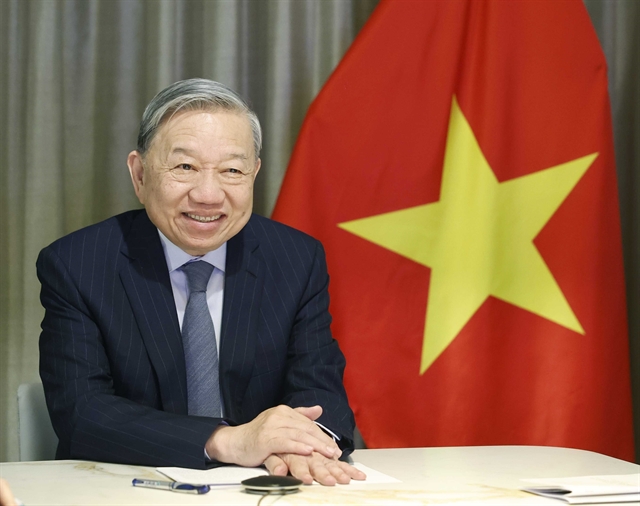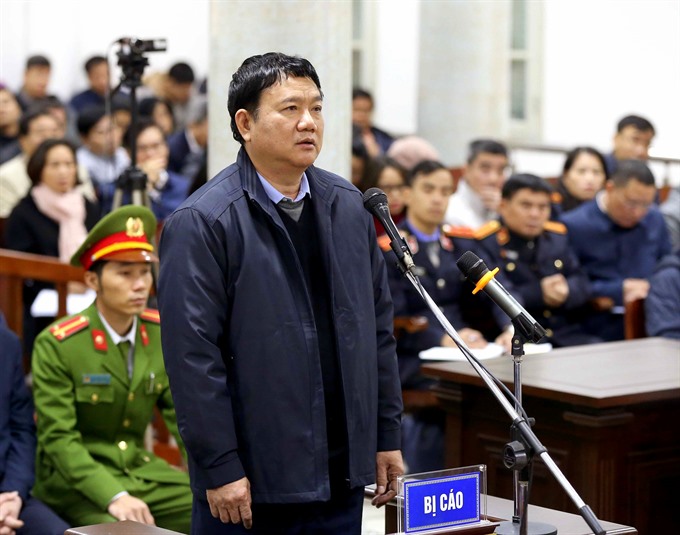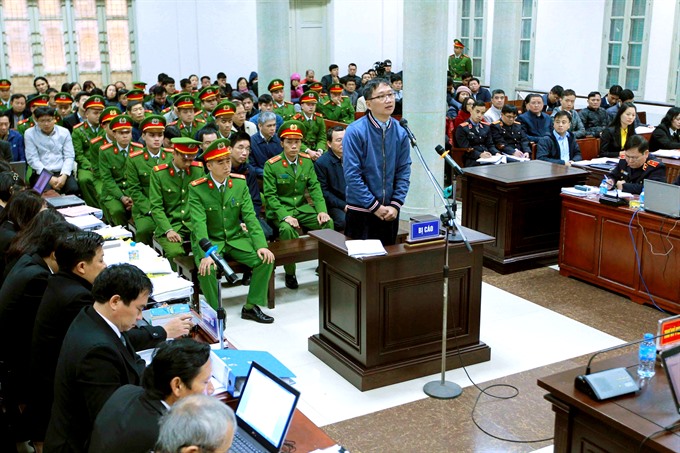 Politics & Law
Politics & Law

On the second day of a trial looking into violations at the State-owned oil group, interrogation of defendants continues with a focus on economic mismanagement during the implementation of Thái Bình 2 thermal power plant project.
 |
| In the box: Đinh La Thăng, former Politburo member and chairman of State-owned PetroVietnam, answers judging panel questions. — VNA/VNS Photo An Đăng |
HÀ NỘI — On the second day of a trial looking into violations at the State-owned oil group, interrogation of defendants continues with a focus on economic mismanagement during the implementation of Thái Bình 2 thermal power plant project.
Defendants Đinh La Thăng and Trịnh Xuân Thanh were moved for interrogation from an isolated room to a courtroom.
Đinh La Thăng, former Politburo member and chairman of the PetroVietnam (PVN), is alleged to have awarded the contract of the power plant to one of PVN’s subsidiary, PetroVietnam Construction JSC (PVC), against the law, despite knowing that PVC was struggling financially.
Thăng is also alleged to have directed subordinates to sign engineering, procurement, and construction (EPC) No 33 papers for the power project with PVC and given an advance payment of US$6.6 million and VNĐ 1.3 trillion to PVC under this contract, against regulations.
PVC is alleged to have misused part of the advances, causing losses of VNĐ 120 billion (US$5.268 million) to the State.
Responding to the judging panel if he had noted anything amiss in the problematic EPC contract, Trịnh Xuân Thanh, former chairman of PVC, admitted that he had not carefully read the contract’s terms and directed former general director of PVC, Vũ Đức Thuận, to sign it.
According to Thanh, PVC was one of the five most important subsidiaries of PVN, responsible for construction of in-land projects. When PVN decided to merge a number of other member companies into PVC, aside from loans to operate itself, PVC needed to increase borrowings to invest into these newly added members, he said.
Despite being aware of PVC’s financial problems, Trịnh Xuân Thanh maintained that only PVC was capable of implementing the power plant project in Việt Nam. He was explaining PVN’s decision to award the contract to PVC.
Thanh denied any involvement in the request as well as the use of advance payment from PVN, saying that this was “PVC’s general director’s authority, without the need for approval from the board of directors”.
However, defendant Phạm Tiến Đạt, PVC’s former chief accountant, argued that Trịnh Xuân Thanh had been briefed on the need to secure the advance payment as well as a plan to use it during numerous meetings, but Thanh did not make a protest.
Nguyễn Mạnh Tiến, PVC’s former deputy director, told the court he signed documents requesting advances from PVN following directions from Thanh. He said every expenditure was fully documented, however, he admitted that, following directions from senior people, he mistakenly thought the idle money could actually be used for other purposes. He reiterated that the usage of the advances was definitely approved by the board of directors.
Đinh La Thăng said PVN’s decision to award the power plant contract to PVC originated from the guideline to develop PVN into a robust corporation with multifaceted strength and to increase its revenues.
He said in 2009 February, the then Prime Minister Nguyễn Tấn Dũng agreed to let PVN award contracts to its subsidiaries to carry out projects. Based on this approval, PVN had established a number of member companies to develop "professionally in multiple areas", with PVC being the head construction agency of the oil group.
Đinh La Thăng also admitted his haste, saying that the Government urged early implementation of the power-plant project, but he thought joint-venture contractors would take too much time and that selection of a domestic contractor would take less time, and therefore he asked the Government to allow PVC to become the contractor.
Thăng claimed that at the time, PVN’s reports showed that PVC was totally capable of handing the project.
Thăng denied allegations that he directed the signing of contract No 33. — VNS
 |
| Accused: Trịnh Xuân Thanh, former PetroVietnam Construction JSC, answers the judging panel. — VNA/VNS Photo An Đăng |




